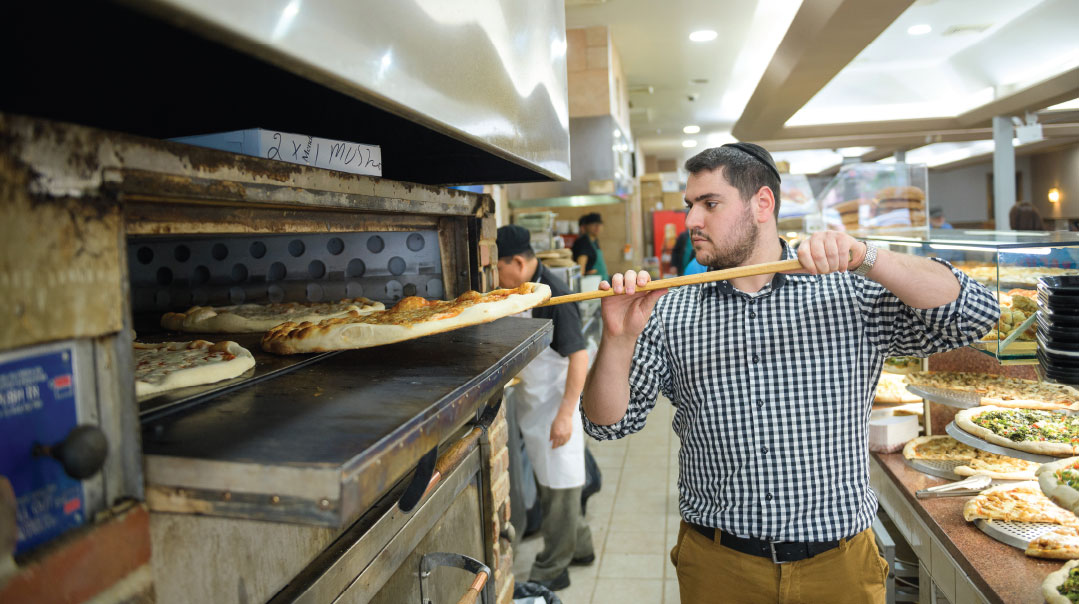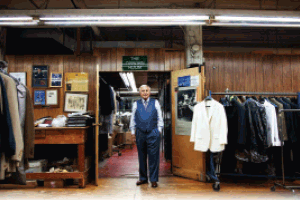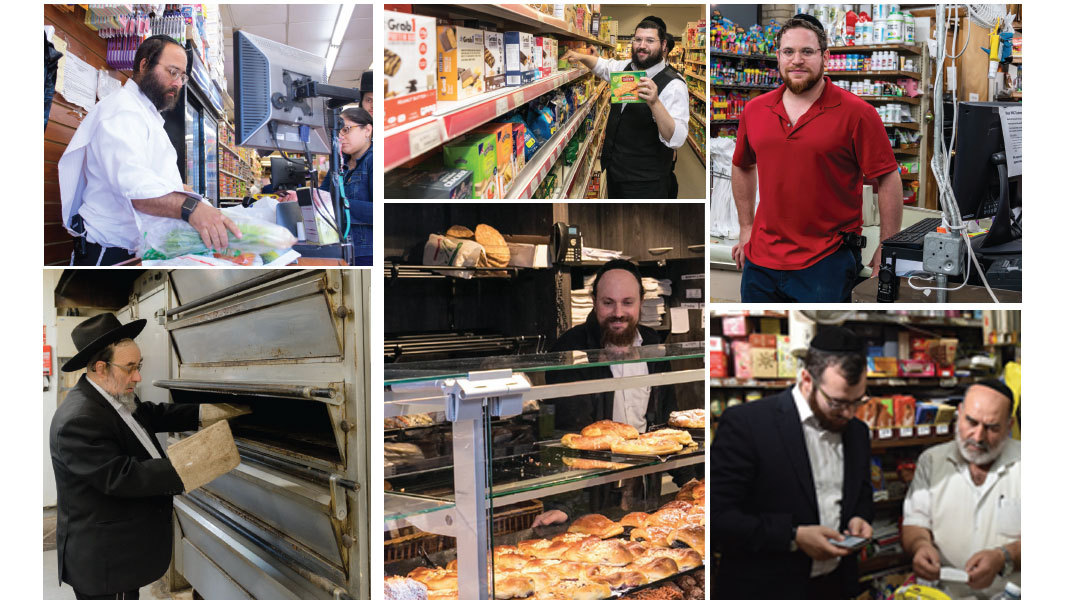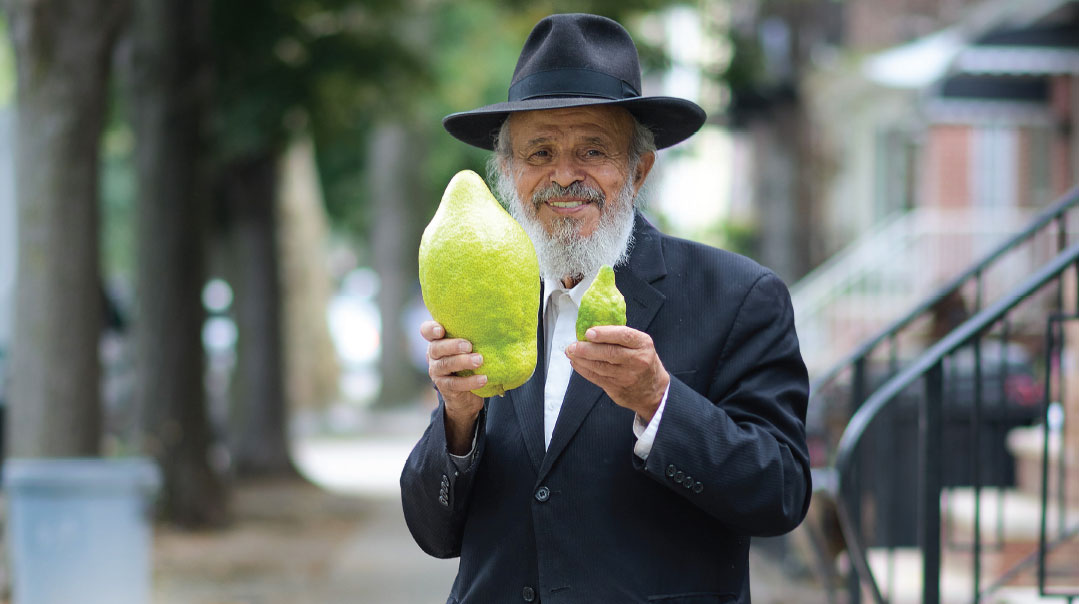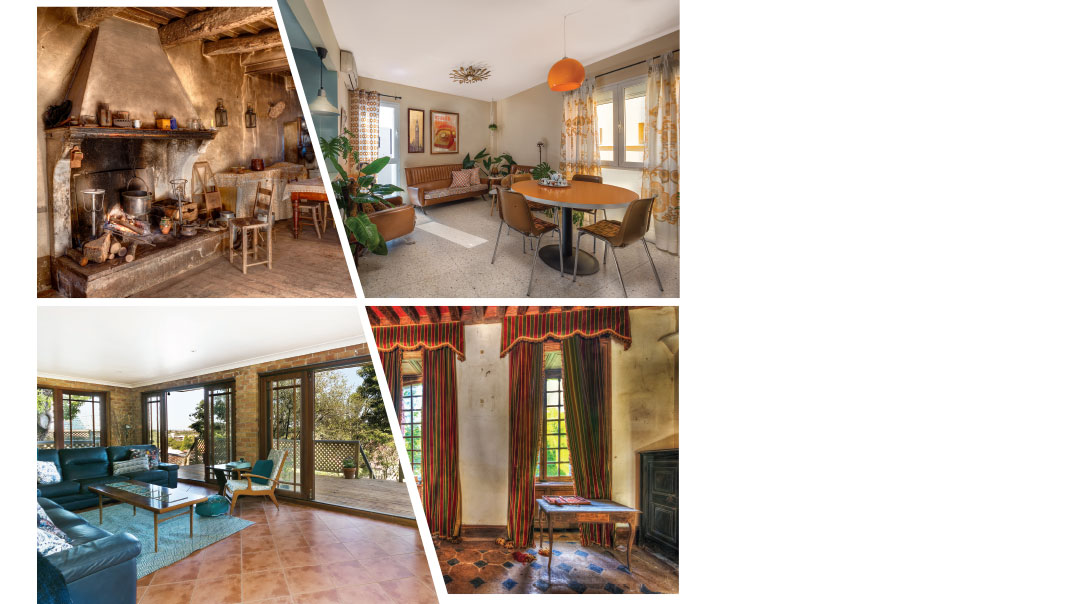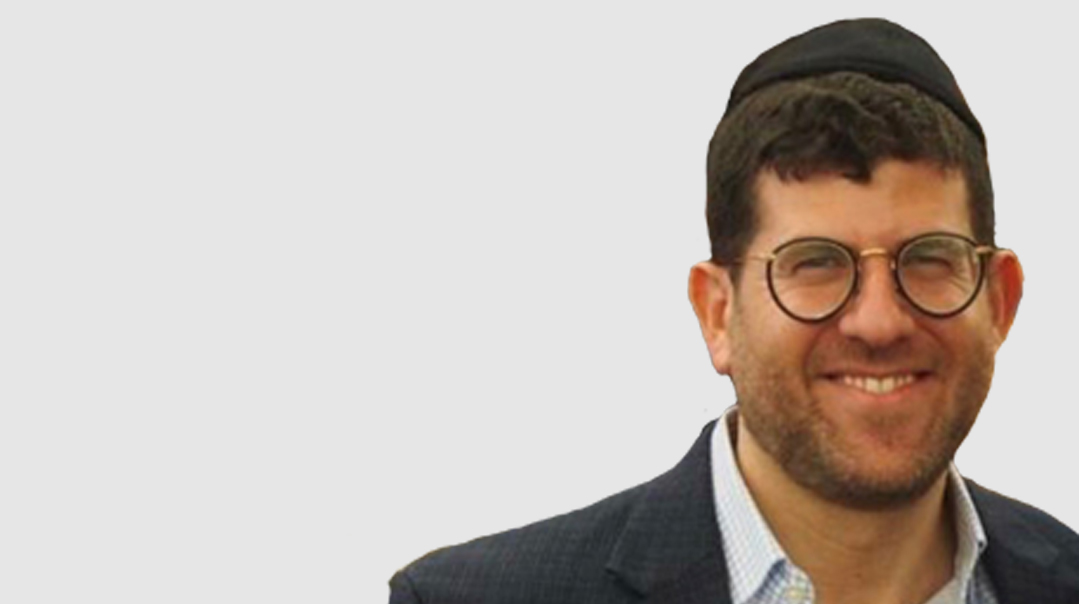Still Playing After All These Years
| September 20, 2010 Music is an integral part of Jewish life. Yet professional Jewish music as we know it can be traced back to a handful of professionals who began to make music in an uncharted frontier. Meet the artists who carved the face of modern Jewish music.
Music is an integral part of Jewish life. Yet professional Jewish music as we know it can be traced back to a handful of professionals who began to make music in an uncharted frontier. Meet the artists who carved the face of modern Jewish music.
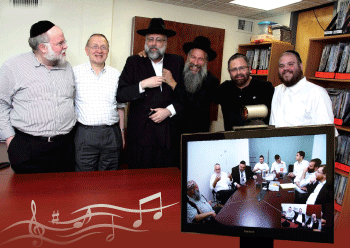
Nowadays all it takes is a simple switch of a button to be transported to a world of thousands of songs all individually selected and stored in an apparatus smaller than your palm.. The wide variety of styles and the plethora of composers all give the feeling that we live in a generation of an abundance of musical selection. But with any musical interlude there is also the overture — the introduction to a rich heritage of Jewish music. The first chapter the beginning notes echo in a vast emptiness where only a few composers stepped cautiously paving the way for those in the future. It is the story of those original composers who already decades ago were working on projects which eventually led to the professionalism and the bounty of Jewish music today.
The music world has gone through drastic changes and major transformations from the time not so long ago when songs were recorded on vinyl LPs and played on record players or tapes. Those first artists of modern chassidic music have witnessed the transformation and the evolution of the Jewish music market from its modest beginnings to the flourishing enterprise it is today.
The digital revolution notwithstanding Mishpacha gathered together those original pioneers in an effort to glean the experiences and insights of this unique group of people who paved the way for so many others. An international reunion in Israel via transatlantic video conference brought together these vintage artists from both sides of the globe.
Around the tables were Rabbi Boruch Chait Mordechai Ben David Yisroel Lamm Yeshaya (Shia) Mendelowitz Gideon Levin Yossi Green Yerachmiel Begun and Yossi Piamanta for a sometimes nostalgic probing discussion on the past present and future of Jewish music.
Tell us about those early days when each of you took your first steps. Each of you is an expert in different facets of the production of Jewish music. What was it like when you first started out?
Composer Yisroel Lamm,who has been in the business for over four decades reminisces: “I always enjoyed music, and I tried to think how to make a hobby and parnassah come together. I started playing at weddings in my brother’s band, until I had an opportunity to create my own album. One of my early solo projects was with the London School of Jewish Song in 1973. In those early days I also had the privilege to work with Rav Baruch (Chait) in Camp Sdei Chemed.”
Mordechai Ben David (Werdyger) says he heard music even before he was born. “My father [chazan Reb David Werdyger] was the first to record chassidishe music. They were mostly songs in a chazanus style which he produced in several albums. He was the chazan at the time for Yaakov Yehoshua Hecht, known back then as J.J. Hecht. J.J. Hecht was a Chabad avreich who brought my father the idea of producing his songs on record. He came to him and said, ‘Reb David, if you want to be worth something in America you must record an album.’ This is actually how the whole thing started. When I was a young boy he already put out ‘Lo Seivoshi.’ ”
Mordechai Ben David spontaneously begins to sing the first few notes of the song...
“We, his four sons constantly received this special atmosphere of chazanus which he brought into our home. It accompanied our Shabbos zemiros which were a family experience. But of the four of us brothers, I was the only one who never wanted to sing along. At some point I decided to put out an album, but I’ll skip that part because it was never publicized. After that, I had the zechus of making my first real album, which, as I said, was really my second. It was called ‘Hineni,’ with my dear friend who is sitting here with us, Reb Yisroel Lamm, who arranged the musical accompaniment.”
Music producer Shia Mendelowitz was a bochur in Yeshivas Torah Vodaas when he was called to audition before Rabbi Eliyahu Teitelbaum, z”l, an esteemed educator later renowned for initiating the telephone-based Kol Hadaf shiurim. In those days, Rabbi Teitelbaum arranged the Pirchei Boys’ Choir and was one of the first producers of Jewish music.
Mendelowitz relates that he created his very first album when he was only sixteen.
“Rabbi Teitelbaum was my rebbi back in my cheder days. He keenly recalled my love of music and, after a series of auditions, admitted me to the Pirchei Boys’ Choir. We remained close until his recent passing.”
Yerachmiel Begun’s musical career also began at the age of sixteen. “Someone visited our home one Shabbos and began singing a tune that he’d composed himself. He taught us the song, and we sang together with him at the Shabbos table. I was awed by the experience and expressed my amazement to my father, who asked our guest to teach me how to compose a song. On Motzaei Shabbos, the man sat beside our piano and showed me how he created his own music. I was inspired by the possibility and decided to try it myself. When I returned to yeshiva, I began recording musical sketches on my hand-held tape recorder. From there, I progressed to studying professional musical composition which ultimately led me to found the Miami Boys’ Choir.”
“Yerachmiel,” Rabbi Baruch Chait of Jerusalem turns to Begun, who speaks on a live-screen connection from New York. “Do you remember when we recorded our first joint album, Kol Salonika back in 1974?”
Yerachmiel Begun was not Rabbi Baruch Chait’s only protégé. Today, Rabbi Chait serves as rosh yeshiva of Ma’arava in Moshav Mattisyahu; and his musical creations have been sung by some of the greatest singers in the Jewish world. He is widely considered one of the early pillars of the Jewish music industry.
His musical career, beginning in the late 1960s, produced many popular songs that have endured until today, including Rachem B’chasdecha, Va’ani B’chasdecha Batachti, Kol Ha’olam Kulo, and Mi Ha’ish.
He relates, “My father, ztz”l, taught me to play the harmonica, and the very first song I composed with his help was ‘Rabbos Machshavos’ in 1967. Yisroel, you played the trumpet in that album, and Eli played a bongo.
“Yisroel [Lamm] and I worked at Camp Agudah, where we produced the very first Pirchei album together with Eli Teitelbaum, z”l, who directed the camp educational activities. During those lazy vacation days, we somehow raised the notion of creating an album called Yibane HaMikdash. I also remember reviewing the list of songs for our second album, which included ‘Mi Ha’ish ’ ”
Lamm, famed conductor and producer, recalls his initial meeting with Rabbi Chait before they began working on these projects. “Reb Baruch, the first time I visited your studio was when you recorded The Rabbis’ Sons. I also remember your appearance in the Israel Music Festival that took place in Central Park in Manhattan.”
“Indeed,” Rabbi Chait affirms. “The Rabbis’ Sons was conceived when I was learning in a branch of Chafetz Chaim Yeshiva in Montreal. Our Rosh Yeshiva had sent us there for two weeks to fundraise for the yeshiva, and I thought of this innovative way to raise money by recording an album that we could market publicly, with all proceeds benefitting the yeshiva. A little effort led us to a fantastic musical crew, and, accompanied by our guitars, we were set to go.
“When the Rosh Yeshiva heard my plan, he called me into his office. He agreed that it was definitely an original plan, and remarked that he would be pleased if the yeshiva would benefit from the additional support. However, he requested that the yeshiva’s name should not be printed on the album. Of course, I agreed, but now we were stuck without a name for our album. Eventually, we realized that three out of the four of us were all sons of rabbis. (Rabbi Chait is the son of the late Rosh Yeshiva of Moshe Chait of Chafetz Chaim in Yerushalayim, ztz”l.) So we hit on the name The Rabbis’ Sons.”
Glued To the Record Player
Composer Yossi Green arrived to our meeting in the company of popular impresario Gershi Moskowitz. Green, who has composed numerous hit songs including Aderaba, Tanya, and Di Da Bei, attributes the seeds of his musical career to two incidents in his life. His professional career, too, mingled with those others in the room, with whom he worked and acquired professional experience.
“The morning after my bar mitzvah, I discovered that one of my presents was a tape recorder that in those days must have cost about $300. (For comparison sake, let me explain that my parents’ monthly rent was only $75!) My bar mitzvah was on a Wednesday; that Friday afternoon, when I returned home from yeshivah, I decided to try recording my own composition. I used the words of Shir Hama’alos, and the tune came out beautiful.
“My father, a”h, returned home at around five and asked me, ‘Nu, bar mitzvah bachur’l, what are you are up to on this Friday afternoon?’ I replied, ‘Ich hab gemacht a niggun’— I wrote a song. I clearly remember his expression and reaction; he was not pleased. ‘What?’ he asked in shock, ‘Your first Erev Shabbos as a bar mitzvah, and you’re composing songs?! Don’t waste time with this foolishness.’ That was his initial reaction to my song-writing.
“Still, my first real encounter in the world of Jewish music was when I finally met Yigal Calek in London, when I composed my first song, Kol B’Rama, and since then I’ve been composing and singing nonstop. The rest, as they say, is history.”
“Or the rest is the future,” adds Yossi Piamenta.
“Like Yossi Green, whose first recording was on a personal tape recorder,” Gideon Levine interjects, “My story begins several years earlier —with a phonograph. We lived in Yerushalayim, and I was making my way down Tzefania Street toward Beis Knesses Har Tzvi. Several buildings away from the shul was an electronics store, and there was a phonograph and four records in the display window. My eyes were glued to those records, and I can remember their names until today: The Sanzer Rebbes; Reb David Werdyger’s Meilitzer; Rabbi Ben Zion Schenker; and Reb Shlomo Carlebach’s Av HaRachamim. I wanted those records and the music so badly that I began saving every extra penny until I could afford to buy a phonograph and those records. I spent so many hours listening to music that my mother wanted to throw the phonograph in the garbage. It was only afterward that I reached the next stage of creating my own music. I learned to play the clarinet and began composing my own melodies.”
Yossi Piamenta was also born in Israel. Yet, at twenty-five, he left Israel for New York to work for legendary saxophonist Stan Getz. His plan was to play together with Getz, who at that time, was considered the leading jazz musician of the era. Piamenta had impressed the musician during his visit to Israel in 1976.
In New York, Yossi was befriended by Lubavitcher Chassidim, who drew him closer to his heritage and inspired him to teshuvah. Over the years, Piamenta married and raised six children, while establishing himself as a leading guitarist. “I spent many years in the secular music industry, accompanying world-renowned artists. One Friday night, I was almost electrocuted while playing on a stage in Nahariya, and for weeks, the newspapers called me the ‘electrified guitarist.’
“In any case, my trip to America and the assistance of my Lubavitch friends led both me and my brother back to Torah and mitzvos, and we began to play at various Jewish benefit concerts. One day, we were playing in San Diego for Rabbi Pratkin, when Mordechai [Ben David] and Yisroel [Lamm] appeared on stage. We were their start-up group. We were warming up for the event, and Yisroel Lamm walked over to us and said, ‘Wow!’ We were something new to him, and we intrigued him.”
“I’ll interrupt you for a moment to share what I was thinking at that moment,” says Lamm. “When I heard you playing that day in the empty auditorium, I thought to myself, ‘Jewish music will never be the same again.’
“We returned to New York a week later,” Piamenta continues, “and I received a phone call from Neginah Orchestra, informing me that conductor Yisroel Lamm had heard me in San Diego and was inviting me to the Continental Hall in Williamsburg to play for him again. The entire Neginah band was there waiting for me: Yisroel Lamm as the lead; Shelly Lang on the keyboard; along with a whole crowd of orthodox musicians who came to watch me play the guitar. No more than several days passed before I received an official invitation to join Neginah Orchestra. At the time, I believe that I was one of the only guitarists in the Jewish music industry.
“When I first began playing for Neginah, people would approach me and ask, ‘How can you play Jewish music on this kli tumah (impure instrument)?’ I replied: ‘Don’t you hear what you’re saying? It’s only an instrument, a musical instrument; it’s not impure on its own. It can be employed for either purity or impurity; it’s all a matter of how you play it.
“In any case, my initiation into the world of Jewish music was through song, not through notes, and through the spirited dancing at Jewish weddings that I attended.”
Today, when there are so many singers and a seemingly infinite number of recordings and productions, is the Jewish music of 2010 better or worse than the original?
Yerachmiel Begun: “Let me make something clear. Most composers, fifty, sixty years ago, didn’t play instruments. I assume that whoever composed the popular songs like Siman Tov U’mazel Tov or Hoshia es Amecha didn’t compose them with the help of any instrument. Today’s musicians and composers are more ‘musical,’ and know more about the art of playing music, but don’t understand the art of musical composition and the depth of music. This is the essential difference between the past and the present. And the proof is that the melodies that are composed without the help of musical instruments — these songs are more similar to songs of the past and sound as if they were written 25 years ago.”
Yossi Green: “He’s a hundred percent right. This also creates a debate about new styles of music that can’t be catalogued as kosher for the chareidi population. I, for example, think that when a song is written by a chassid, it’s a chassidic song. If it’s written by a non-Jew, no matter how ‘chassidish’ or Jewish it sounds, it’ll remain a non-Jewish song. Furthermore, if the song is written by a yeshivah bochur, it doesn’t matter how much it sounds like it comes from the secular world, it remains a yeshivish song.”
Mordechai, what’s your opinion on what Yossi Green just said? Are there songs today that are called ‘chassidic’ songs which you won’t sing?
MBD: “Before you ask me that, I want to ask you something. You asked us about our opinion of the music of the past and the music of today. I want to understand exactly what you’re referring to. Then I’ll be able to answer your question.”
Music of today is rhythmic. The listener connects to the musical influence that comes from without, instead of from within. Is that very different from your original style?
MBD: “First of all, you should know that I don’t listen to secular music. I don’t listen to music at all, not Jewish music and certainly not non-Jewish music. That’s first. The second thing is that for me, Jewish music is measured by whether the melody and the arrangement conveys and aptly explains the meaning of the lyrics, and as a result of putting psukim to music, it connects the listener to HaKadosh Baruch Hu. When it doesn’t do that, it isn’t Jewish music.
Mordechai, what do you think about songs, in which you would never expect the words to be put to music? For example, there are some songs which take words from the Gemara which no one understands — neither the words nor their connection — without sitting down and learning them. You’re sitting next to Yossi Green, so I’ll ask you, seriously, with all due respect — the melody of ‘Didoh Bei’ — does it convey the meaning of the words, or is it just a nice song that makes people happy?
MBD: “There are, first of all, a number of kinds of songs. I once heard from the Lelover Rebbe that there are three crowns of song. There are melodies of simchah, melodies of hisorerus, awakening, and melodies of hisromemus, elevation. You understand? The idea of a simchah melody is clear: ‘You can’t sing unless you’re happy.’ If you’re singing at a wedding, you can’t sing sad songs, because the essence of the song at a wedding is to gladden the chassan and kallah. And there are melodies of hisorerus such as ‘Tefillah le’Ani’ or ‘Tanya.’ In addition, there are songs of hisromemus like ‘Nisgav HashemLevado’ from the Skulener Rebbe, or ‘Va’Yeidu ki Atah Shimcha Hashem.’ Aside from this, I don’t see in today’s music any difference from those I sang in the past.”
Gideon Levine: “The arrangement is different, but the performance stays the same. Mordechai’s song stays the same. And I agree with him that the lyrics need to connect with the melody and to explain them. And that can only come from the heart and from the meaning. If you take a melody and you take words — and it’s not important from where, tefillah or Hallel, for example — and you put it to music, this will be an authentic Jewish song. But I’d like to respone to your question about Didoh Bei. I know that Didoh Bei really came from kavannah. Yossi is an avreich who learns every day. I’m also telling you something Yossi himself told me, that his wife puts his Gemara on his bed every day, so that he won’t forget to learn the Daf Yomi. When someone has such yiras shamayim, his songs reflect that.”
Yossi Green: “It’s important to mention that everyone who learns this Gemara and who is musical can see that the words ‘Didoh Bei’ are a poem. We can assume that when Chazal learned this and said ‘Didoh Bei, Kula Bei, Delo da Bei, Mah Bei’ [loosely, “Whoever has Torah has it all, whoever doesn’t has nothing”] it was an expression that was commonly used in Eretz Yisrael. By composing this song, we let this expression, this poem, this rhythmic tune appropriate for musical notes, succeed in explaining the Gemara’s question with its melody. I want to add that I went to the son of Rav Yaakov Kamenetsky, Rav Binyamin, on Purim with Shia Mendelowitz who introduced me to Rav Binyamin. The Rav told Shia that he already knows me. As it was my first time meeting him, I was shocked. Then he explained to Shia that I was, ‘the best maggid shiur in the world.’ I asked him, ‘Are you talking about Tanya?’ and he responded, ‘Tanya? What are you talking about? Didoh Bei, Kula Bei! The entire world now knows this daf Gemara in your merit.’
“So as I said before, in my eyes, a Jewish song is defined as a song written by a Jew. What’s important is who wrote it originally. Like Yerachmiel mentioned before, years ago Jewish composers wrote music in a more natural way, less mechanically. Also, as Mordechai said, if the song touches Jewish emotions, that’s a Jewish song.”
Yisrael Lamm: “The song expresses the emotion and expresses our culture. Every culture has its own philosophy and its own emotions. Sometimes these go beyond words. And there are many varied thoughts and feelings that we feel that are all from a Jewish source. Am Yisrael is large and we have a variety of thoughts and feelings. I’ll have my style which I consider Jewish, and someone else will have a style which I’ll consider non-Jewish, but he’ll be certain that its source and its feeling are Jewish. The natural conclusion is that a melody gives expression and meaning to emotions. The question then is, is this emotion really Jewish at its source? It’s possible that a non-Jew will write a song that will express his own feelings and his style will sound Jewish…does this song then become a Jewish song?”
Rabbi Baruch Chait: “I once asked Rav Shlomo Zalman Auerbach, ztz”l, if a Jew can sing or be influenced by listening to secular music. And he said that the real danger is that the listener will relate to the words. Because youth will listen to songs and lyrics that come from a place of tumah. But, he continued, and said that the melody itself — if a Jew hears a melody that becomes something that’s sung at seudas shlishis or melaveh malkah, part of the zemiros, or he puts tefillah to it, we can no longer say that that is not a Jewish song. It’s important to carefully check the roots of the melody, and at the end of the day, the completed work becomes Jewish. Therefore, when yeshivah bochurim, or chassidic courts sing it, it takes on Jewish meaning.”
MBD: “I want to respond to what you just said, Reb Baruch. Rebbe Nachman said that if a Jew takes a melody from a non-Jew and sings it on Shabbos, it receives holiness. I’d like to add that throughout the generations, music always was influenced from the surroundings. In Gur, for example, they sang marches and waltzes which were Polish. Karliner melodies were influenced by the Russians. And so on. Everywhere that Jews lived, they were influenced by the local music.”
There is a small technical glitch in the system, and the panel members use the break to spontaneously get up, join hands to dance, and sing Mordechai Ben David’s Amar Rabi Akiva, Ashreichem Yisrael.
What was the most moving moment in your career?
MBD: “There were several moments that were very special. One of the events that I remember was in Emanuel, when I looked out on an audience of 150,000 people, on Chol haMoed, all in their Shabbos clothes. The Pnei Menachem was there, and also, not to be mentioned in the same breath, Arik Sharon, arriving by helicopter. I can add many more moving moments: performing for children who were suffering from cancer, or visiting special summer camps.”
Yossi Piamenta: “Mordechai, do you remember when we had an audience of three? We went to the hospital and there were three children. We felt more emotion there, than at a performance in front of hundreds or thousands of people.”
Yisroel Lamm: “I have to be honest and say that, for me, it’s very simple to find that moment. It was when Yeshayah Mendelowitz convinced me to stand before sixteen orchestra members who were playing in the second HASC concert. Until that moment, I’d never conducted such an orchestra, live. It was Shia who told me, “You can do it.” And as I stood there, conducting those many musicians who sat there responding to my gestures — that was one of the greatest moments for me.”
Applause follows Yisroel Lamm’s words.
Shia Mendelowitz: “I had a moment of great emotional tension. It was at one of the band’s first appearances, scheduled to start at 7:30. At 7:20, they told us that all the sound equipment was not working. You can imagine the level of tension I was experiencing.
But if I’m picking a moment of positive emotion, then I think that was the band’s first appearance, when everything worked out wonderfully in the end. After that successful night, it was clear to all of us that a change had been made in the music industry. Because until then, concerts were held on smaller stages. The evening was designated for the children of HASC and was produced very beautifully and professionally. At the end of the evening, when I realized that everything had gone smoothly and as planned — that was a special moment for me.”
More applause.
Yerachmiel Begun: “My moment takes me back to 1995, when I brought the Pirchei Miami choir to its historical appearance that was held in the giant arena of Nassau Coliseum in Uniondale, New York. That was one of the first performances in America. I had decided to take on a performance for 15,000 viewers. I can point to a specific moment that I’ll never forget — it was when I gazed out from the stage at the thousands of people who were gathered together for the performance that Chol haMoed, and I understood that I’d succeeded in this complex production.”
Rabbi Baruch Chait: “I remember when I was with Mordechai in Bayit Vegan, and Mona [Rosenblum] was there, too. And we played for Menachem Ehrenthal, whose parents later established the outstanding organization Zichron Menachem in his memory. I remember that Menachem asked me to compose a song that evening, on the words, “Lo amus, ki echyeh – I shall not die, but live.” After the song was composed, we rehearsed it and sang it to him. That was very, very emotional.”
MBD: “You surely remember that Menachem was in a wheelchair that evening. He’d been in it for six months. When I stood beside him, he asked me to help him get up, because he wanted to dance. At first, I didn’t understand what he was saying. I held his hand. But he insisted, ‘I want to stand up.’ And indeed, he did stand up, and he danced.
The two start to sing the end of “Pischu li shaarei tzedek … Zeh hashaar tzaddikim yavo’u vo.” Soon, we’ve all joined in singing the moving song.
Yossi Piamenta: “My moment was in the first years that I was living in Brooklyn, during one of the Chabad simchos beis hashoeivos where I was taking part as a guitarist for a band that was playing for a dancing crowd in Crown Heights. Thousands of people were dancing in front of me in circles. The police had closed off several blocks and there was complete separation between men and women. Everyone was dancing.
“Around midnight, Mordechai [Ben David] suddenly went up onto center stage, and I saw that more and more people were still arriving, joining thousands already there. I couldn’t even see the end of the crowds, because those who were dancing on the edges were coming towards the center. The simchah was so great that it touched me to the core.”
Gideon Levine: “My moment was three years ago, in the Shomrei haChomot Beit Avot in Jerusalem, where my parents lived. I decided to put on a performance for them and for the other elderly people who live there. Eli Laufer and Ephraim Mendelson were with me. My mother, z”l, and my father, he should live till 120, were sitting opposite me and listening to a song that I sang especially for them. When I saw the effect that it was having on them, I felt an emotion that I can’t describe.
By the way, speaking of Zichron Menachem, I also wrote a song for the Ehrenthal family: “Al eileh ani bochiyah … Menachem meishiv nefesh.” The same evening that I was performing for my parents, I met Mrs. Ehrenthal and I told her about the song that I’d written especially for Menachem, z”l. She asked to hear it and sat in the car and cried. Afterwards, she told me that in such moments, her son Menachem was with her.”
Let’s imagine, hypothetically, that Shia Mendelowitz is listed in some future encyclopedia. What would you like to be written there?
“The Jewish music producer!” Yossi Piamenta suggests.
But Shia doesn’t agree with him. After a few seconds’ thought, he answers, “The truth is, that I wouldn’t want my name to be mentioned at all. But if so, then what I value most is that I was zocheh to work with good, professional, and talented friends.
“You can add something else. We’re talking here about chassidic music, and though I’m not officially a chassid, I composed a famous chassidic song. Hashem gave me the zechus to compose a song that the whole world sings, and that’s the well-known song of Siman Tov u’Mazal Tov that was produced especially in honor of the Belzer Rebbe’s only son’s wedding.
Yisrael Lamm: “For me, the choice is simple — the album “The Philharmonic Experience.” And after that, the first “Lev v’Nefesh.” And this man who’s sitting here quietly — I made a number of albums with him.” He points to MBD. “I made The Double Album with him. I can also say that the height of my success was the professionalism in philharmonic music that I made together with Shia. Classical music is my preference.”
Gideon Levine: “We say songs and praises, every day, hallel v’zimrah … oz u’memshalah, netzach u’gvurah … And above all these, “blessings and thanksgiving to Your great Name.” The meaning here is, that we can see clearly that praise to Hashem comes by means of song, by means of music. I haven’t yet attained my great accomplishment. But every time I see that a song of mine does something to someone, whether an awakening or a joyousness, I see a special achievement in that. Not only an achievement, but a mission.”
Rabbi Baruch Chait: “Rabbeinu Bachye makes exactly that point. In his introduction, he writes that a person is obligated to find some detail, some characteristic that Hashem gave especially to him, and with that unique essence, to give praise and thanksgiving to Hashem. Whatever a person has that’s special, that’s unique, therein lies his personal mission to serve Hashem.”
Yossi Piamenta: “My achievement, in my humble opinion, is that I succeeded in introducing an instrument that wasn’t accepted in Jewish music and Jewish bands. Today, there isn’t a Jewish band without a guitar. Once, that’s not how it was. There were saxophones, trumpets, trombones, but no guitar. So that’s a big achievement, for which I take the credit.”
MBD: “My big career achievement? First of all, I didn’t know I had a career. But if you really want to know — my father, he should be well, until a few years ago, every time I spoke with him, he used to ask me, “Nu, when are you going to work already, like a mentsch?” But what I can say, is that the songs like “Moshiach” and “Ma’aminim,” are sung all over Eretz Yisrael, by the secularists and by the religious. What this actually shows us, is that each and every Jew, no matter who he is, even the lowest Jew, still believes the truth and feels it in his heart. And these songs bring out that potential. The minute that a person, no matter how secular — even if he, nebuch, eats on Yom Kippur — the minute that he hears this song, it does something to him. That shows us that the pintele Yid is there in him, and it can’t be extinguished.”
Reb Baruch Chait: “I agree with what Mordechai says, that it’s possible to bring song not only to our religious world. A song that all the Jewish People feel as a contribution, a song like “Kol haOlam Kulo” that’s sung by soldiers and others. That Am Yisrael gains something, that maybe even I contributed a little. I think that this idea, for a ben Torah, a ben yeshivah, to know that not everything is treif-assur-pasul, is very important. He can always find a way with his wholesomeness to attain achievements, whether by way of music or by way of singing, and that completes the prayers and the learning, the mussar, the derech eretz, and the middos.
And that’s not something that’s pasul. On the contrary. What was the great achievement in the Beis HaMikdash? The prayer, the song. And what was the achievement of the neviim? That prophecy was only attained through song and joy. And even in our world today, this message is found, that this is a part of serving Hashem.”
(Originally featured in Mishpacha, Issue 327)
Oops! We could not locate your form.








